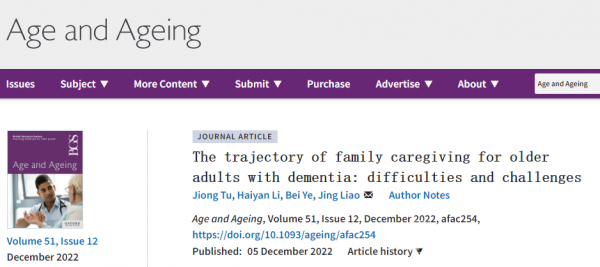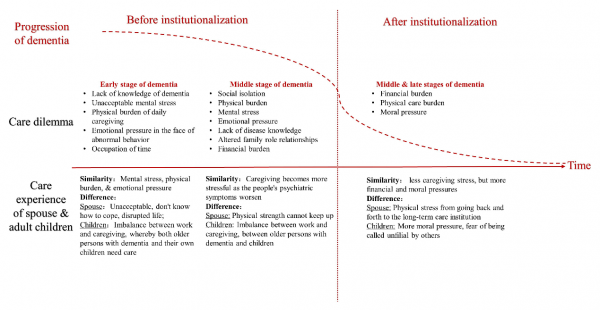Li Haiyan, a young academic with a Ph.D. at the Law School of Chengdu University (CDU), co-authored the essay "The trajectory of family caregiving for older adults with dementia: difficulties and challenges" and published it in Age and Ageing (IF=12.782), a world-leading journal in geriatrics.

The study conducts long-term trajectory investigations and follow-up surveys for 13 families with older people with dementia (PwDs), systematically elaborating on the caregivers’ (spouses or children) responsibilities and struggles from home care to institutional care and analyzing the common tipping points leading to institutional care from their perspectives. The essay's corresponding author is Associate Professor Liao Jing at the School of Public Health at Sun Yat-sen University. Associate Professor Tu Jiong at the School of Sociology & Anthropology, Sun Yat-sen University, and Dr. Li at the Law School, CDU are the first authors.
It is an anthropological retrospective study that takes qualitative study and interview methods. A field survey was conducted in the disability and dementia care section of a care institution combining elderly care and medical service in Chengdu, Sichuan Province, from 2019 to 2020. Thirteen family members (i.e. 5 spouses and 8 adult children) of older PwDs (meeting the criteria for exclusion) in this section were selected as study objectives. Face-to-face, semi-structured interviews were carried out with these family members during family caregivers’ visits. The study finds that (see Figure 1) family caregivers’ experiences before and after the PwDs’ institutionalization fell into two distinctive parts, and three subthemes about their caregiving experiences in each period were identified: the mental stress, the physical care burden, and the social and emotional pressure connected to home-based care; the moral pressure and emotional torment, the financial burden, and worries about the institution's service quality. The tipping points in between the two stages were major changes or incidents related to the PwDs’ status. Furthermore, variations in the spouse and older children’s care experiences also emerged. The main variation is that spouses tend to have more emotional torments and physical care burdens, while adult children struggle more with the care-work-family balance and moral pressure.

Trajectory Before and After the PwDs’ Institutionalization
Everyone may be the caregiver one day, and it is a long and constant process. The process continues after the PwD's institutionalization. Given the vital role played by family caregivers in taking care of PwDs, their physical, mental, and economic burdens should be properly laid. This study provides a systematic analysis of the plight of family caregivers for PwDs at all stages, providing the primary evidence for the need for adequate medical and social resources. What's more, it reflects on how long-term care insurance can regulate the conflict between family care and institutional care in the context of traditional Chinese culture.
Essay link: https://doi.org/10.1093/ageing/afac254